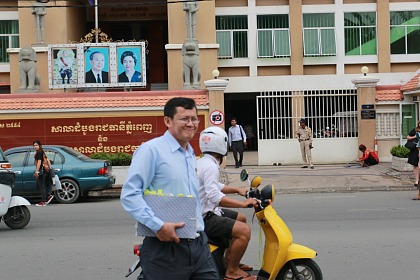Supreme Court Rejects Conviction of Former Rights Worker
Published on 1 October 2018A defamation conviction against former human rights worker Ny Chakrya was rejected and referred back to the Appeal Court for re-trial this morning due to insufficient evidence. The case marks the first use of a repressive penal code article criminalising criticism of judicial decisions.
The former Cambodian Human Rights and Development Association (ADHOC) staffer – and current Deputy Secretary-General of the National Election Committee – was convicted to six months in prison and fined six million riel (US$1,500) by Phnom Penh Municipal Court on 22 September 2016. He was found guilty of defamation, malicious denunciation and unlawfully coercing judicial authorities (Articles 305, 311 and 522 of the Cambodian Criminal Code).
Chakrya was charged following a complaint by an investigating judge and a deputy prosecutor at Siem Reap Provincial Court over comments he allegedly made at two ADHOC press conferences in May 2015 regarding a land dispute case and the jailing of two victims of land rights violations.
His conviction was upheld by the Appeal Court on 15 December 2016.
The Supreme Court has now ruled that both lower courts failed to prove that Ny Chakrya had actually made the alleged comments.
There were several other discrepancies in the trial process. The civil parties and their lawyers were not present at the Supreme Court trial, denying the defendant the right to confront his accusers directly, as was the case at the municipal court. Ny Chakrya’s right to prepare and conduct his defence at Phnom Penh Municipal Court and the Appeal Court was also hampered as he was held in pre-trial detention at the time, accused of being an accomplice to bribery in a separate politically-motivated case.
Civil society groups objected to the addition of Article 522 (“Publication of commentaries intended to unlawfully coerce judicial authorities”) in the penal code in 2010 on the grounds that it violates freedom of speech and criminalises legitmate advocacy work of civil society groups supporting judicial reforms.
- Related
- Topics
- Expression/Assembly Judiciary/Rule of Law








